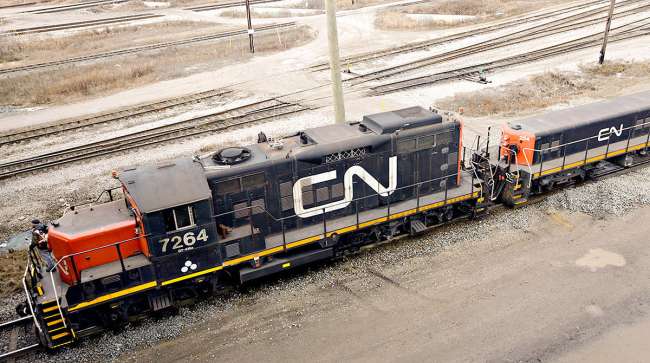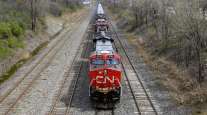Senior Reporter
3,200 Union Workers With Canadian National Railway Go On Strike

[Stay on top of transportation news: Get TTNews in your inbox.]
Canadian National Railway pleaded for a neutral arbitrator Nov. 21 to resolve a strike by thousands of its conductors, yard workers and other employees who walked off the job Nov. 19, in the first strike against the Class 1 railroad in a decade.
“We have proposed to present our arguments to a neutral arbitrator to end this dispute, and we hope the union will be willing to do the same. Through binding arbitration, a neutral arbitrator would hear our positions and make a decision,” J.J. Ruest, CEO of the Montreal-based railroad, said in a statement Nov. 21.
The workers are represented by the Teamsters Canada Rail Conference, which issued a 72-hour strike action notice Nov. 16 to the railroad after the talks, taking place in Montreal, became deadlocked.
“Unfortunately, we were unable to reach a deal with CN. The company remains unwilling to address safety issues,” the union said in a tweet.
Unfortunately, we were unable to reach a deal with CN. The company remains unwilling to address safety issues. As a result, CTY members at CN are on strike. https://t.co/abByIeOwyl pic.twitter.com/PXUs2Ltncs — Rail Conference (@TeamstersRail) November 19, 2019
The two sides have been at the bargaining table since the previous collective bargaining agreement expired July 23.
Canadian National ships oil, gas, mining, forest and agriculture products. It is the country’s largest railway, in terms of both revenue and the physical size of its rail network, and is Canada’s only transcontinental railway company from the Atlantic coast in Nova Scotia to the Pacific coast in British Columbia across about 20,400 route miles.
“Safety is a core value,” Ruest said. “Although the union has claimed that the strike was about safety, those statements do not reflect our discussions. For the safety concerns raised, we have proposed viable solutions because we want all employees to go home safely at the end of their shift.”
The union posted on its website that safety issues are at the forefront of the dispute: “Some of the outstanding issues include safety, fatigue, time off provisions and lifetime caps on benefits. While seeking these concessions, Canadian National posted 3.8 billion in revenue for the third quarter of 2019.” (The railroad reports results in Canadian dollars.)

Ruest
Ruest said no employee is ever asked to work unsafely. He added that railcars may be coupled with the use of a remotely controlled locomotive while crews are safely positioned.
“Any employee that feels fatigued or has safety concerns has a duty to report it and use alternative means to complete his or her assigned task safely,” he continued.
Canada’s Transportation Safety Board cited in its 2018 annual report that fatigue was a serious problem in all sectors of the transportation industry, and it was a contributing factor in more than 90 investigations since 1992.
Some business leaders have said the strike is already being felt across Canada. For example, nearly 3 million tons of vegetable oil is transported each year by rail.
Chris Vervaet, executive director of the Canadian Oilseed Processors Association, told Transport Topics his members fear a long walkout.
“COPA’s members run 24/7, 365 days a year and really any hiccup in rail logistics has an immediate impact on our member companies’ facilities to sell to the marketplace,” Vervaet said. “We have already seen a curbing of production at some of our production facilities.”
Vervaet said because CN has an extensive rail network, it is the main option for many oil seed processors, and moving large volumes of oil by truck is not practical.
“While there is an opportunity to divert some of the traffic, it is not a solution,” he said. “About 70% to 80% of what we produce is shipped by rail.”
Want more news? Listen to today's daily briefing:




